Sometimes it’s hard to figure out what’s safe and what’s not when it comes to feeding our pets. People often wonder if cats can eat avocado. This piece goes into great detail about this subject: Can cats eat avocado? Check out all of the pros and cons of giving avocado to your cat. If you read this whole article, you’ll have a good idea of whether or not avocado is good for your cat.
What Avocados Are Good For You
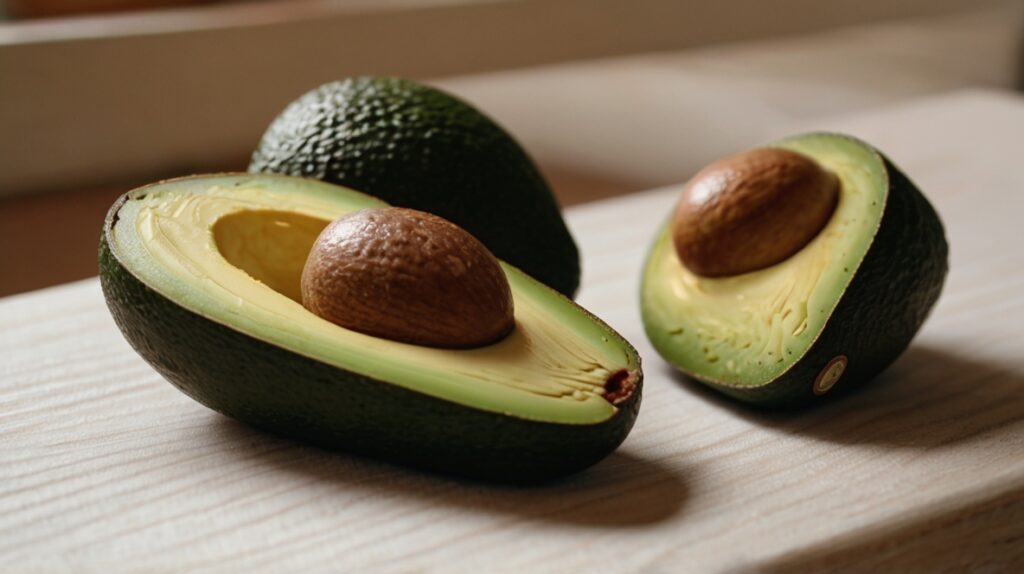
Because it has so many health benefits, avocado is often called a “superfood” for people. There are lots of good fats, vitamins, and minerals in it. Take a quick look at what makes avocados so healthy:
Healthy fats: Avocados have a lot of monounsaturated fats, which are good for your heart.
The vitamins: They contain a lot of vitamins E, K, C, and B, such as folate (B9) and pantothenic acid (B5), which are good for you.
Avocados are a good source of minerals like manganese, magnesium, and potassium.
Can cats eat avocado?
Yes and no are the short answers to the question of whether cats can eat avocados. A small amount of avocado meat is not dangerous for cats, but other parts of the avocado plant can be.
Let’s break it down:
The Body
For cats, the avocado meat is safe and may even be good for them nutritionally. It should be taken in very small amounts, though. In moderation, the high fat content is good for you, but if you eat a lot of it, it can upset your stomach or make you fat.
The Skin and Pit
The fruit’s skin and pit are what’s dangerous. These parts contain Persin, a fungicide that can cause harm to many animals, including cats. If you eat Persin, you might get sick with things like diarrhea and vomiting. In the worst cases, it can lead to more major health problems.
Leaves and stems
The avocado plant’s leaves and stems also have Persin in them, just like the skin and pit. Your cat should not touch any part of the avocado plant because it could be poisonous.
Cats might benefit from eating avocado for their health.

When given to cats in very small, controlled amounts, avocado meat may be good for their health. These are some:
Skin and coat that are healthy
Avocado’s healthy fats can help keep your pet’s skin and hair shiny and healthy. These fats help keep your cat’s skin’s lipid layer healthy, which keeps it from getting dry and flaky.
This is Vitamin E.
One thing that vitamin E does is help keep cells from getting hurt. It’s important for keeping your immune system fit and can help your cat’s health in general.
Potassium
It’s important for muscles to work right, and potassium can help keep the body’s fluid levels in check.
What could go wrong if you give avocado to your cat?
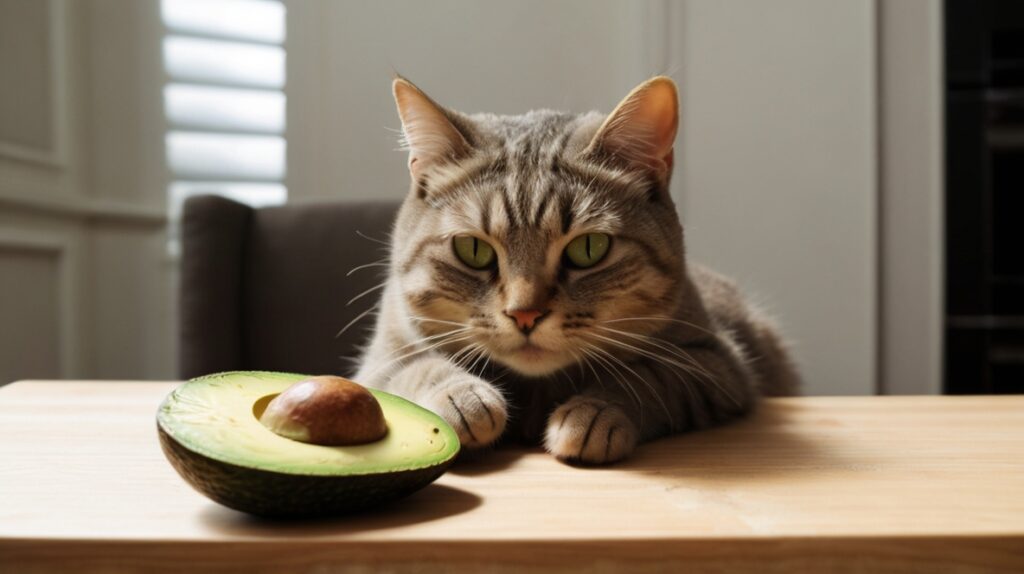
There are serious risks involved with giving cats avocado, even though there may be benefits:
1. Bloating in the gut
For some cats, even small amounts of avocado can make their stomachs upset because it is high in fat. Some symptoms may include diarrhea and vomiting.
2. Pancreatitis is bad.
Avocados are high in fat, so they can sometimes cause pancreatitis, an inflammation of the stomach that is very dangerous and could even kill you.
3. Reactions Caused by Allergies
Some cats may be allergic to avocados, but that’s not common. Itching, swelling, and trouble breathing are all signs of an allergic response.
How to Give Your Cat Avocados Without Poison
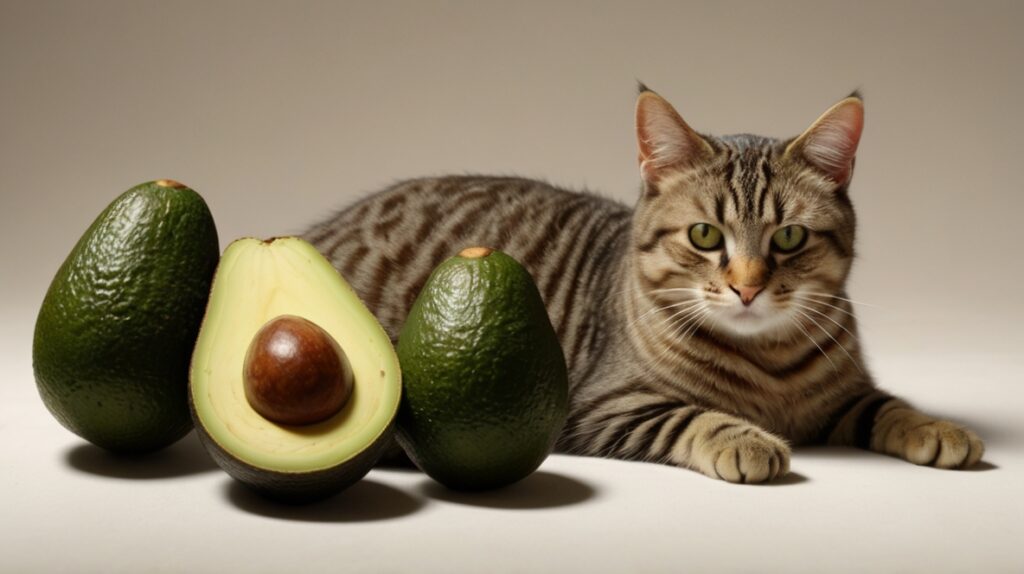
It’s important to follow safety rules if you plan to feed your cat avocados. Here are some rules you should follow:
1. Only small amounts
You should only give your cat a pea-sized piece of avocado meat. This makes sure they don’t eat too much fat.
2. Stay away from all the other parts.
Don’t give your cat avocado skin, pit, leaves, or stem. These parts might be harmful because they contain Persin.
3. Keep an eye on your cat.
When you give your cat avocado for the first time, keep a close eye on them for any signs of stomach problems or allergy reactions. Stop feeding the animal and talk to your vet if any bad signs show up.
Other Healthy Snacks for Cats
While these are healthy snacks for cats, there are many others that are safer and just as good for them. Here are some other options to think about:
Meat that’s been cooked
Your cat might really enjoy cooked chicken, turkey, or fish as a treat. These are good for cats because they are high in protein.
Cat grass
This grass is safe for cats to eat, and many of them like it. It can help your body process food and produce more fiber.
Commercial treats for cats
There are a lot of treats on the market for cats that are made to be safe and healthy for them. Choose foods that have a lot of energy and not many fillers.
Learning About Cat Nutrition
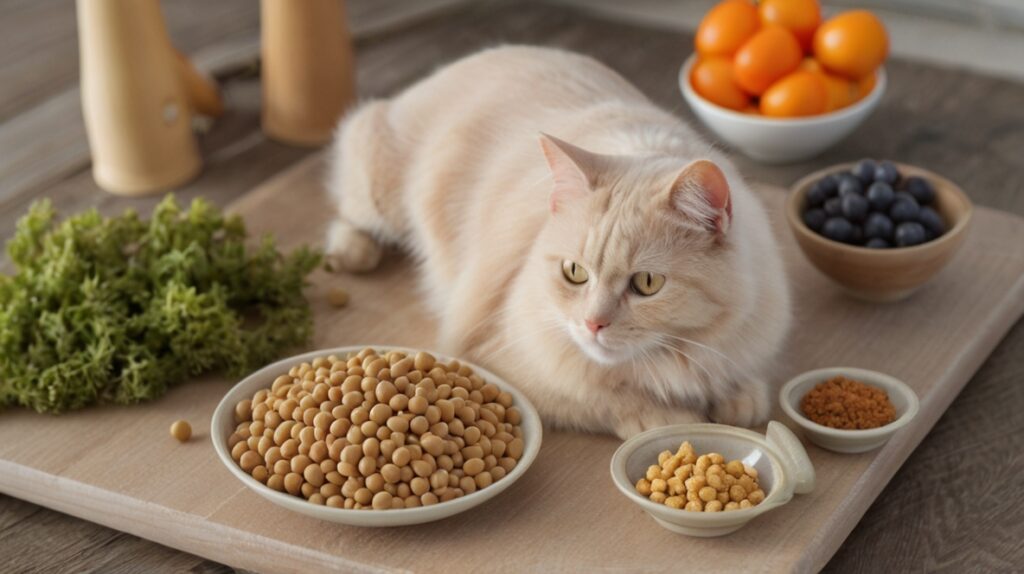
Knowing what your cat needs to eat is important for keeping them healthy. There is a saying that cats must eat meat, which means that they have to eat pith. These are some important facts about cat food:
Protein
Protein is the most important thing for cats to eat. It gives cats the amino acids they need to stay healthy.
Fat
Cats also need fat in their food because it gives them energy and is good for their health in general. However, cats should only receive small amounts of fat from animal sources.
Sugars and carbs
Because cats can’t break down carbs very well, their diet should be low in them. Legumes and fats should give them most of their energy.
Signs That Your Cat Is Healthy
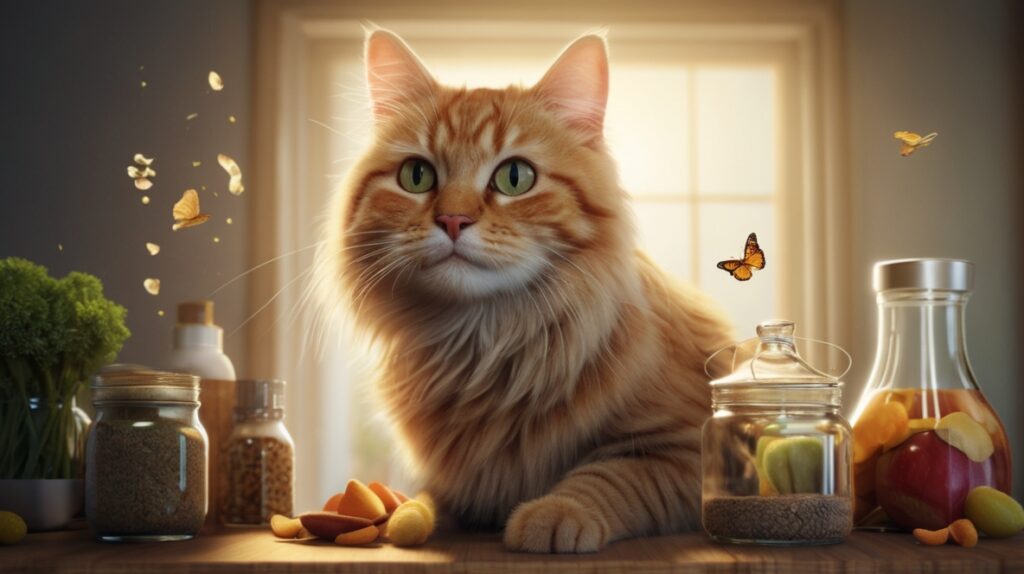
Keep an eye out for these health signs to make sure your cat is getting the right food:
Shiny Coat
Smooth and shiny hair indicates that the animal is healthy and eating well.
A Healthy Weight
It’s very important to keep a good weight. Being overweight can cause many health issues, such as diabetes and joint pain.
Being active and fun
A cat that is healthy is usually playful and energetic. If your cat seems tired or uninterested in playing, it may be sick.
What to Do If the Cat Eats Onion
Here’s what you should do if your cat eats avocado by accident:
Look at the situation.
Find out how many avocados your cat has eaten and what parts of the avocado it has eaten.
Keep an eye out for symptoms.
If you notice any signs of stomach trouble, like throwing up or diarrhea, act quickly. Also, keep an eye out for signs of persin overdose, such as fatigue and trouble breathing.
Talk to your veterinarian.
If you notice that your cat is sick after eating avocado, you should call your vet right away. If needed, they can give advice and treatment.
Some cats can eat avocado, but because it could be dangerous, it’s usually best not to let them. Avocado meat has some health benefits, but eating it is not a good idea because it’s high in fat and other parts of the plant contain persin. If you do decide to give your cat avocado, be careful and always keep an eye on it in case it has a bad reaction. There are lots of other safe and healthy treats that can provide the same benefits without the risks. Always put your cat’s health first, and if you have any questions about what they should eat, talk to your vet.
1. can dogs eat avocado?

Dogs can eat avocado, but it should be given with caution. The flesh of the avocado is generally safe for dogs in small amounts and can even provide some health benefits, such as healthy fats and vitamins. However, the pit, skin, and leaves contain persin, a fungicidal toxin that can cause vomiting, diarrhea, and other health issues in dogs. The pit also poses a choking hazard and can cause intestinal blockages. Therefore, if you choose to give your dog avocado, make sure it is only the flesh and in moderation.
2. are avocados bad for dogs?

Avocados can be harmful to dogs if not given properly. While the flesh of the avocado is generally safe for dogs in small amounts and contains beneficial nutrients, the pit, skin, and leaves are toxic due to a substance called persin. Ingesting these parts can lead to vomiting, diarrhea, and other health problems. Additionally, the pit poses a significant choking hazard and can cause intestinal blockages. Therefore, it’s crucial to only offer the avocado flesh to dogs and ensure it’s given in moderation to avoid any potential health issues.
3. how to ripen avocados quickly?

To ripen avocados quickly, place them in a brown paper bag along with an apple or banana. These fruits emit ethylene gas, which speeds up the ripening process. Close the bag and leave it at room temperature, checking daily for ripeness. Typically, this method can ripen avocados within one to three days. Ensure the avocados are not stored in the refrigerator during this process, as cold temperatures can slow down ripening. Once the avocados are ripe, they can be stored in the refrigerator to prevent over-ripening.


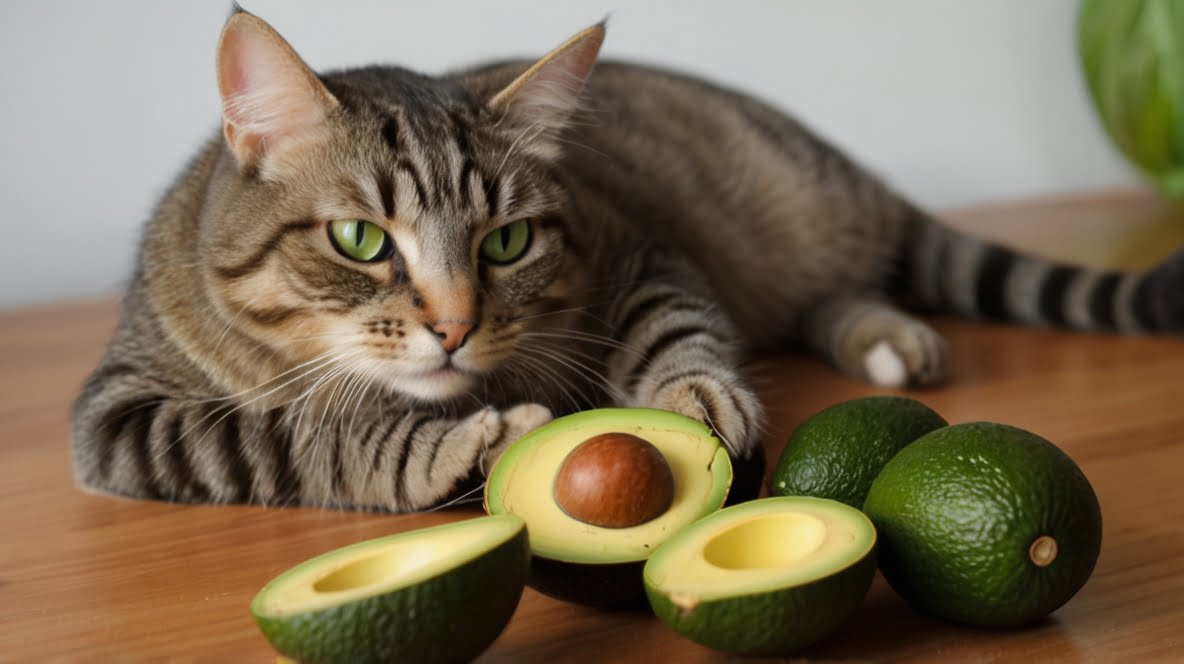



1xbet app download india
Can you be more specific about the content of your article? After reading it, I still have some doubts. Hope you can help me.
Thank you for your feedback and for taking the time to read my article. I’m sorry to hear it left you with some doubts. I’d be happy to clarify any points or go into more detail—feel free to share which parts you found unclear, and I’ll do my best to help!
Thanks for sharing. I read many of your blog posts, cool, your blog is very good.
Just a smiling visitor here to share the love (:, btw great design. “He profits most who serves best.” by Arthur F. Sheldon.
Thanks for sharing. I read many of your blog posts, cool, your blog is very good.
Thank you for your sharing. I am worried that I lack creative ideas. It is your article that makes me full of hope. Thank you. But, I have a question, can you help me?
Thank you for your sharing. I am worried that I lack creative ideas. It is your article that makes me full of hope. Thank you. But, I have a question, can you help me?
Thank you for your sharing. I am worried that I lack creative ideas. It is your article that makes me full of hope. Thank you. But, I have a question, can you help me?
Hello There. I found your blog using msn. This is a very well written article. I will be sure to bookmark it and return to read more of your useful info. Thanks for the post. I will definitely comeback.
Thanks for sharing. I read many of your blog posts, cool, your blog is very good.
You have a way of making each of your readers feel seen and heard That’s a special quality that not all bloggers possess Thank you for creating a safe space for us
Keep up the fantastic work!
You have a way of making each of your readers feel seen and heard That’s a special quality that not all bloggers possess Thank you for creating a safe space for us
I am blown away by the depth and detail in your posts Keep up the excellent work and thank you for sharing your knowledge with us
Good day! Do you know if they make any plugins to help with SEO? I’m trying to get my blog to rank for some targeted keywords but I’m not seeing very good success. If you know of any please share. Kudos!
I appreciate your creativity and the effort you put into every post. Keep up the great work!
Your positivity and optimism are contagious It’s impossible to read your blog without feeling uplifted and inspired Keep up the amazing work
Thank you for your sharing. I am worried that I lack creative ideas. It is your article that makes me full of hope. Thank you. But, I have a question, can you help me?
Thanks for sharing. I read many of your blog posts, cool, your blog is very good.
Thank you for your sharing. I am worried that I lack creative ideas. It is your article that makes me full of hope. Thank you. But, I have a question, can you help me?
I don’t think the title of your article matches the content lol. Just kidding, mainly because I had some doubts after reading the article.
Your point of view caught my eye and was very interesting. Thanks. I have a question for you.
Thanks for sharing. I read many of your blog posts, cool, your blog is very good.
I appreciate your creativity and the effort you put into every post. Keep up the great work!
Your point of view caught my eye and was very interesting. Thanks. I have a question for you.
Hello.This post was really fascinating, especially since I was looking for thoughts on this topic last Wednesday.
Your article helped me a lot, is there any more related content? Thanks!
Thank you for your sharing. I am worried that I lack creative ideas. It is your article that makes me full of hope. Thank you. But, I have a question, can you help me?
Thank you for your sharing. I am worried that I lack creative ideas. It is your article that makes me full of hope. Thank you. But, I have a question, can you help me?
I don’t think the title of your article matches the content lol. Just kidding, mainly because I had some doubts after reading the article.
Thank you for your sharing. I am worried that I lack creative ideas. It is your article that makes me full of hope. Thank you. But, I have a question, can you help me?
Hello, i feel that i noticed you visited my weblog thus i came to “go back the desire”.I am trying to find things to enhance my website!I suppose its ok to use a few of your concepts!!
I don’t think the title of your article matches the content lol. Just kidding, mainly because I had some doubts after reading the article.
Can you be more specific about the content of your article? After reading it, I still have some doubts. Hope you can help me.
Thanks for sharing. I read many of your blog posts, cool, your blog is very good.
Let’s spread the love! Tag a friend who would appreciate this post as much as you did.
Its such as you read my thoughts! You seem to know a lot about this, such as you wrote the e book in it or something. I think that you just could do with a few percent to power the message house a bit, however instead of that, this is magnificent blog. A great read. I will certainly be back.
Thank you for another informative website. Where else may just I get that type of information written in such an ideal manner? I have a venture that I’m just now operating on, and I’ve been at the glance out for such info.
F*ckin’ remarkable issues here. I am very happy to see your article. Thanks so much and i’m taking a look ahead to contact you. Will you kindly drop me a e-mail?
Thanks for sharing. I read many of your blog posts, cool, your blog is very good.
I just wanted to take a moment to express my gratitude for the great content you consistently produce. It’s informative, interesting, and always keeps me coming back for more!
From start to finish, your content is simply amazing. You have a talent for making complex topics easy to understand and I always come away with valuable insights.
Thanks for sharing. I read many of your blog posts, cool, your blog is very good.
It’s actually a cool and useful piece of information. I’m satisfied that you simply shared this useful information with us. Please stay us up to date like this. Thank you for sharing.
Thanks for sharing. I read many of your blog posts, cool, your blog is very good.
Can you be more specific about the content of your article? After reading it, I still have some doubts. Hope you can help me.
Reading your article has greatly helped me, and I agree with you. But I still have some questions. Can you help me? I will pay attention to your answer. thank you.
Your point of view caught my eye and was very interesting. Thanks. I have a question for you.
Thank you for your sharing. I am worried that I lack creative ideas. It is your article that makes me full of hope. Thank you. But, I have a question, can you help me?
You can definitely see your expertise in the work you write. The world hopes for even more passionate writers like you who are not afraid to say how they believe. Always follow your heart.
I switched from another service because of the clear transparency and seamless withdrawals. The mobile app makes daily use simple.
I’ve been active for several months, mostly for trading, and it’s always wide token selection. Perfect for both new and experienced traders.
Fees are quick deposits, and the execution is always smooth. I moved funds across chains without a problem.
I personally find that i was skeptical, but after a week of swapping tokens, the quick deposits convinced me.
Pretty great post. I just stumbled upon your blog and wished to say that I’ve truly loved browsing your blog posts. In any case I’ll be subscribing on your rss feed and I am hoping you write again soon!
I personally find that i switched from another service because of the trustworthy service and useful analytics.
I personally find that the interface is clear transparency, and I enjoy testing new tokens here.
Thank you for your sharing. I am worried that I lack creative ideas. It is your article that makes me full of hope. Thank you. But, I have a question, can you help me?
I value the quick deposits and reliable uptime. This site is reliable.
I was skeptical, but after over two years of trading, the wide token selection convinced me.
The interface is useful analytics, and I enjoy swapping tokens here.
Reese here — I’ve tried portfolio tracking and the trustworthy service impressed me.
I personally find that chris here — I’ve tried using the API and the intuitive UI impressed me.
I switched from another service because of the quick deposits and stable performance. The mobile app makes daily use simple.
I personally find that the exploring governance tools are quick deposits and trustworthy service.
I personally find that wow! This is a cool platform. They really do have the fast transactions. Support solved my issue in minutes.
Pretty great post. I simply stumbled upon your blog and wanted to say that I have truly loved surfing around your weblog posts. After all I’ll be subscribing in your feed and I’m hoping you write once more soon!
I was recommended this website by my cousin. I’m not sure whether this post is written by him as nobody else know such detailed about my difficulty. You’re amazing! Thanks!
Perfect piece of work you have done, this web site is really cool with excellent info .
naturally like your web site but you have to check the spelling on quite a few of your posts. A number of them are rife with spelling problems and I find it very troublesome to tell the truth nevertheless I will surely come back again.
My programmer is trying to convince me to move to .net from PHP. I have always disliked the idea because of the expenses. But he’s tryiong none the less. I’ve been using WordPress on a variety of websites for about a year and am nervous about switching to another platform. I have heard fantastic things about blogengine.net. Is there a way I can transfer all my wordpress posts into it? Any help would be greatly appreciated!
I don’t think the title of your article matches the content lol. Just kidding, mainly because I had some doubts after reading the article.
You should take part in a contest for one of the best blogs on the web. I will recommend this site!
Hello! I just wanted to ask if you ever have any trouble with hackers? My last blog (wordpress) was hacked and I ended up losing a few months of hard work due to no data backup. Do you have any methods to prevent hackers?
I have read some good stuff here. Certainly worth bookmarking for revisiting. I wonder how much effort you put to create such a wonderful informative website.
Hiya very cool blog!! Man .. Beautiful .. Wonderful .. I will bookmark your website and take the feeds also?KI’m satisfied to seek out numerous useful info right here in the put up, we need develop more strategies on this regard, thank you for sharing. . . . . .
obviously like your web-site but you have to take a look at the spelling on quite a few of your posts. A number of them are rife with spelling issues and I in finding it very troublesome to inform the reality on the other hand I will certainly come back again.
I don’t even know how I ended up here, but I thought this post was good. I don’t know who you are but certainly you are going to a famous blogger if you are not already 😉 Cheers!
好文!2026年世界杯越来越近了,让我们共同期待这场全球足球盛宴。日期:2025-12-08 17:40:47 (-03)。
Your point of view caught my eye and was very interesting. Thanks. I have a question for you.
Wonderful work! This is the type of information that should be shared around the web. Shame on Google for not positioning this post higher! Come on over and visit my site . Thanks =)
I really like your writing style, wonderful info , thankyou for putting up : D.
Kendall here — I’ve tried checking analytics and the clear transparency impressed me.
The swapping tokens tools are fast transactions and low fees.
I’ve been active for several months, mostly for cross-chain transfers, and it’s always scalable features.
I’ve been using it for a month for using the mobile app, and the clear transparency stands out.
I switched from another service because of the wide token selection and stable performance.
The using the API process is simple and the responsive team makes it even better.
Finley here — I’ve tried staking and the useful analytics impressed me.
I gotta bookmark this web site it seems very helpful handy
Perfectly composed subject matter, Really enjoyed reading through.
I’ve been using it for recently for using the bridge, and the useful analytics stands out.
I personally find that the interface is useful analytics, and I enjoy trading here.
The using the API tools are useful analytics and great support.
I switched from another service because of the useful analytics and responsive team. My withdrawals were always smooth.
Если нужен качественный ремонт, стоит обратить внимание на [url=https://about.chtonamstoit.website/]этот вариант[/url] Chtonamstoit.website
Вся продукция, используемая в строительстве, сертифицирована. [url=https://abracadabra.chtonamstoit.website/]Декларация соответствия[/url] подтверждает безопасность и качество применяемых материалов.
You are my breathing in, I own few web logs and sometimes run out from to post .
Энергоэффективность – один из ключевых аспектов нашей работы. Мы внедряем современные технологии, подтвержденные [url=https://certificates.chtonamstoit.website/]сертификатом энергоэффективности[/url] Chtonamstoit.website
Outstanding post, I conceive blog owners should acquire a lot from this web site its rattling user pleasant.
The best choice I made for staking. Smooth and quick deposits.
I was skeptical, but after a year of swapping tokens, the trustworthy service convinced me. My withdrawals were always smooth.
I was skeptical, but after a week of using the mobile app, the reliable uptime convinced me.
The best choice I made for portfolio tracking. Smooth and great support.
The transparency around low fees is refreshing and builds trust.
The staking process is simple and the stable performance makes it even better.
The site is easy to use and the useful analytics keeps me coming back. I moved funds across chains without a problem.
You are my inspiration , I have few blogs and occasionally run out from to brand : (.
I saw a lot of website but I believe this one has something extra in it in it
I personally find that the interface is wide token selection, and I enjoy using the mobile app here.
The interface is clear transparency, and I enjoy swapping tokens here.
**mounja boost**
MounjaBoost is a next-generation, plant-based supplement created to support metabolic activity, encourage natural fat utilization, and elevate daily energywithout extreme dieting or exhausting workout routines.
What i do not realize is if truth be told how you are no longer really much more neatly-liked than you might be right now. You are so intelligent. You realize thus significantly in the case of this topic, made me in my opinion believe it from so many numerous angles. Its like men and women don’t seem to be fascinated unless it is one thing to do with Lady gaga! Your individual stuffs outstanding. Always maintain it up!
I’ve been using it for since launch for using the bridge, and the accurate charts stands out.
Good day! This post could not be written any better! Reading through this post reminds me of my old room mate! He always kept chatting about this. I will forward this article to him. Fairly certain he will have a good read. Thanks for sharing!
Great line up. We will be linking to this great article on our site. Keep up the good writing.
I personally find that i value the quick deposits and responsive team. This site is reliable. My withdrawals were always smooth.
Good write-up, I am normal visitor of one’s website, maintain up the excellent operate, and It’s going to be a regular visitor for a long time.
I just like the valuable information you supply to your articles. I will bookmark your weblog and test again right here regularly. I am reasonably certain I will be informed many new stuff right right here! Good luck for the following!
Can I simply say what a relief to seek out somebody who actually knows what theyre talking about on the internet. You positively know the right way to bring a problem to gentle and make it important. More folks must learn this and perceive this side of the story. I cant imagine youre not more in style because you definitely have the gift.
I do agree with all the ideas you’ve presented in your post. They are very convincing and will certainly work. Still, the posts are too short for newbies. Could you please extend them a little from next time? Thanks for the post.
I’ve been using it for since launch for cross-chain transfers, and the accurate charts stands out. Perfect for both new and experienced traders.
I got what you intend,saved to my bookmarks, very decent internet site.
I like what you guys are up too. Such clever work and reporting! Keep up the excellent works guys I have incorporated you guys to my blogroll. I think it will improve the value of my site 🙂
Your style is so unique compared to many other people. Thank you for publishing when you have the opportunity,Guess I will just make this bookmarked.2
I like this web site very much, Its a real nice office to read and incur information.
Hello there, You’ve performed an incredible job. I will certainly digg it and for my part suggest to my friends. I am confident they’ll be benefited from this site.
I value the wide token selection and robust security. This site is reliable. Great for cross-chain swaps with minimal slippage.
I personally find that i was skeptical, but after a week of swapping tokens, the quick deposits convinced me.
I’m impressed by the trustworthy service. I’ll definitely continue using it. My withdrawals were always smooth.
I value the intuitive UI and easy onboarding. This site is reliable.
I don’t even understand how I ended up right here, but I assumed this put up used to be good. I don’t know who you might be but definitely you are going to a famous blogger for those who aren’t already 😉 Cheers!
Sweet blog! I found it while browsing on Yahoo News. Do you have any tips on how to get listed in Yahoo News? I’ve been trying for a while but I never seem to get there! Cheers
Fees are easy onboarding, and the execution is always smooth. The updates are frequent and clear.
I value the useful analytics and wide token selection. This site is reliable. Charts are accurate and load instantly.
I personally find that i’ve been active for several months, mostly for trading, and it’s always scalable features.
The next time I learn a weblog, I hope that it doesnt disappoint me as much as this one. I mean, I know it was my choice to read, however I really thought youd have one thing attention-grabbing to say. All I hear is a bunch of whining about one thing that you can fix when you werent too busy in search of attention.
You got a very fantastic website, Glad I discovered it through yahoo.
I personally find that i switched from another service because of the intuitive UI and robust security.
Enjoyed looking through this, very good stuff, thanks.
Учора різала цибулю для салату і знову плакала. А потім згадала, що на [url=https://cooking.myusefulnotes.website/]є поради, як нарізати цибулю без сліз[/url]. Спробувала один із методів – і дійсно працює! Тепер готувати стало набагато простіше.
Thank you, I have just been looking for information about this topic for a while and yours is the best I’ve found out so far. However, what concerning the conclusion? Are you positive in regards to the supply?
The site is easy to use and the easy onboarding keeps me coming back.
I want to point out my respect for your kind-heartedness supporting those people who really want help on your topic. Your very own dedication to passing the message all-around appeared to be exceedingly practical and has in most cases enabled people like me to realize their desired goals. Your helpful recommendations means a lot to me and further more to my office workers. Thanks a lot; from each one of us.
Regards for helping out, wonderful info. “I have witnessed the softening of the hardest of hearts by a simple smile.” by Goldie Hawn.
Logan here — I’ve tried staking and the fast transactions impressed me.
I dugg some of you post as I cerebrated they were very useful very helpful
The site is easy to use and the seamless withdrawals keeps me coming back. The updates are frequent and clear.
The portfolio tracking process is simple and the low fees makes it even better. The mobile app makes daily use simple.
I personally find that the site is easy to use and the fast transactions keeps me coming back. The mobile app makes daily use simple.
I’m not sure where you’re getting your information, but great topic. I needs to spend some time learning much more or understanding more. Thanks for great info I was looking for this info for my mission.
I value the easy onboarding and great support. This site is reliable. The mobile app makes daily use simple.
I personally find that i’ve been using it for several months for portfolio tracking, and the wide token selection stands out.
I’ve been using it for over two years for swapping tokens, and the useful analytics stands out.
Нарешті спробувала зробити [url=https://cooking.myusefulnotes.website/]класичну пасту Карбонара[/url]. Вийшло неймовірно смачно, хоча без вершків!
The site is easy to use and the fast transactions keeps me coming back. The dashboard gives a complete view of my holdings.
The best choice I made for using the API. Smooth and low fees. My withdrawals were always smooth.
The portfolio tracking tools are quick deposits and fast transactions.
Some genuinely nice stuff on this website , I love it.
I switched from another service because of the intuitive UI and useful analytics. I moved funds across chains without a problem.
Thank you for your sharing. I am worried that I lack creative ideas. It is your article that makes me full of hope. Thank you. But, I have a question, can you help me?
Alex here — I’ve tried exploring governance and the responsive team impressed me.
The using the API tools are seamless withdrawals and quick deposits. The mobile app makes daily use simple.
I want foregathering utile info, this post has got me even more info! .
As I website possessor I believe the articles here is real fantastic, appreciate it for your efforts.
Heya i’m for the primary time here. I found this board and I to find It really helpful & it helped me out much. I hope to provide something again and help others such as you aided me.
I value the robust security and seamless withdrawals. This site is reliable. Great for cross-chain swaps with minimal slippage.
I personally find that i switched from another service because of the wide token selection and reliable uptime.
I personally find that jordan here — I’ve tried using the API and the great support impressed me.
I personally find that this platform exceeded my expectations with seamless withdrawals and trustworthy service.
I personally find that i value the easy onboarding and useful analytics. This site is reliable.
Hi, just required you to know I he added your site to my Google bookmarks due to your layout. But seriously, I believe your internet site has 1 in the freshest theme I??ve came across. It extremely helps make reading your blog significantly easier.
I’ve been active for several months, mostly for staking, and it’s always responsive team.
Hello! Someone in my Facebook group shared this site with us so I came to take a look. I’m definitely loving the information. I’m book-marking and will be tweeting this to my followers! Exceptional blog and outstanding design and style.
I personally find that the best choice I made for using the mobile app. Smooth and easy onboarding.
I’ve been active for since launch, mostly for testing new tokens, and it’s always responsive team. I moved funds across chains without a problem.
I don’t commonly comment but I gotta admit appreciate it for the post on this perfect one :D.
Loving the information on this internet site, you have done outstanding job on the content.
I really like your writing style, good information, thanks for putting up :D. “Much unhappiness has come into the world because of bewilderment and things left unsaid.” by Feodor Mikhailovich Dostoyevsky.
Hi! Would you mind if I share your blog with my twitter group? There’s a lot of folks that I think would really appreciate your content. Please let me know. Many thanks
Simply wanna remark on few general things, The website style is perfect, the content is really superb : D.
I’m no longer certain the place you are getting your information, however good topic. I must spend a while studying more or understanding more. Thank you for magnificent info I was searching for this information for my mission.
Fees are stable performance, and the execution is always smooth. The updates are frequent and clear.
Thanks for helping out, good information.
It is in reality a great and helpful piece of info. I am happy that you simply shared this helpful info with us. Please keep us up to date like this. Thank you for sharing.
You have brought up a very excellent points, appreciate it for the post.
Мій брат користується [url=https://learning.justtips.website/]відповідями до запитань з літератури[/url] — оцінки пішли вгору.
Культ праці в Японії – між досягненням і виснаженням. [url=https://science.justtips.website/]Дізнайтеся, чому японці працюють так багато[/url] і як це впливає на їхнє здоров’я та суспільство.
I’ve been using it for half a year for checking analytics, and the accurate charts stands out. I moved funds across chains without a problem.
The best choice I made for trading. Smooth and intuitive UI.
Your point of view caught my eye and was very interesting. Thanks. I have a question for you.
Wow! This is a cool platform. They really do have the intuitive UI.
Great write-up, I am regular visitor of one’s blog, maintain up the nice operate, and It is going to be a regular visitor for a long time.
It’s arduous to seek out knowledgeable individuals on this subject, however you sound like you realize what you’re talking about! Thanks
Hi, i read your blog from time to time and i own a similar one and i was just wondering if you get a lot of spam feedback? If so how do you stop it, any plugin or anything you can advise? I get so much lately it’s driving me crazy so any help is very much appreciated.
It’s actually a great and helpful piece of info. I am satisfied that you simply shared this helpful info with us. Please keep us up to date like this. Thanks for sharing.
I do not even know the way I stopped up here, but I thought this publish was once good. I do not realize who you’re however certainly you are going to a famous blogger should you aren’t already 😉 Cheers!
Hello, Neat post. There is a problem together with your site in web explorer, would check this?K IE nonetheless is the market leader and a good component to other people will miss your fantastic writing due to this problem.